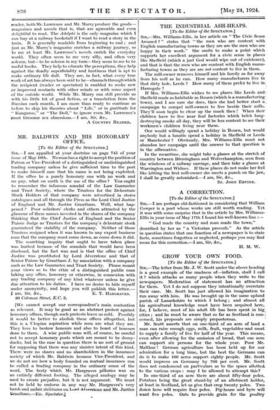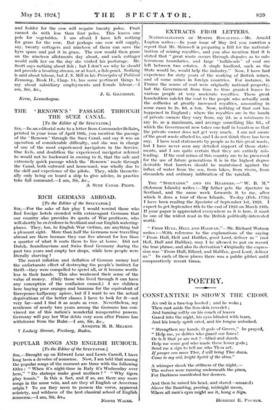GROW YOUR OWN FOOD.
[To the Editor of the SPECTATOR.]
SIR,—The letter from Mr. J. W. Scott under the above heading is a good example of the madness of—inflation, shall I call
? which attacks so many people when they write to the newspapers. Moderation of statement has no attraction for them. Yet I do not suppose they intentionally overstate their case. Mr. Scott has just allowed his imagination to run away with him. He was brought up in the same upland parish of Lanarkshire to which I belong ; and almost all his agricultural knowledge must have been acquired here, for, I believe, most of his adult life has been spent in bigl cities ; and he must be aware that so far as Scotland is con- , cerned, his proposals are simply preposterous.
Mr. Scott asserts that on one-third of an acre of land a man can raise enough eggs, milk, fruit, vegetables-and meat to supply a family of five for half of the year. This means, even after allowing for the omission of bread, that one acre can support six persons for the whole year. Poor Mr. Malthus ! German agriculture has been held up for our admiration for a long time, but the best the Germans can do is to make 100 acres support eighty people. Mr. Scott would improve on Germany by 700 per cent. Mr. Scott does not condescend on particulars as to the space allotted. to the various crops : may I be allowed to attempt this?
In one-third of an acre there are about fifty-four poles. Potatoes being the great stand-by of an allotment holder, at least in Scotland, let us give that crop twenty poles. Two dozen hens will require four poles. Pig-house and byre will want five poles. Oats to provide grain for the poultry
and fodder for the cow will require twenty poles. Fruit cannot do with less than four poles. This leaves one pole for vegetables. I am afraid I have left nothing for grass for the cow. But Perhaps one cow will supply, say, twenty cottagers and nineteen of them can save the byre space and put it in grass. The cow would then graze on the nineteen allotments day about, and each cottager would milk her on the day she visited his pasturage. Mr. Scott says nothing about fish ; but I don't see why he should not provide a trouting stream, or at least, a fish-pond. Nothing is said about labour, but .T. S. Mill in his Principles of Political Economy, Book II., Chap. 14, has some pertinent things to say about subsidiary employments and female labour.—I am, Sir, &c.,











































 Previous page
Previous page